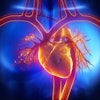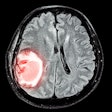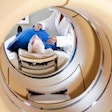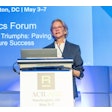LONDON - With a powerhouse coalition of radiology groups behind it, the first annual United Kingdom Radiological Congress (UKRC) kicks off in London’s Wembley Conference and Exhibition Center on Monday.
Although there have been U.K. radiological conferences in the past, the four U.K.-based radiological organizations -- the Royal College of Radiologists, the British Institute of Radiology, the Society and College of Radiographers, and the Institute of Physics and Engineering in Medicine -- wanted a universal congress to represent the allied radiological sciences.
"The objective is, primarily, education. [But] the improved integration of the teams of people who are involved in medical imaging is [another] important aspect," said Dr. Chris Flower, president of UKRC 2001.
Although it is the inaugural congress, organizers anticipate an attendance of 5,000 -- only about 1,000 less than 2001 edition of the well-established European Congress of Radiology (ECR).
"The European Congress is not seen to be as multidisciplinary. I think that [meeting] is seen to be pure radiology. So the ECR is maybe seen as pan-European, but we are getting an increasing number and an increasing interest in the U.K. meeting," said Dr. Peter Griffiths, president-elect of the 2002 UKRC.
In fact, UKRC organizers hope to become the RSNA of Europe, aspiring to "many aspects of the RSNA that we all like and we all turn up for on an annual basis, i.e., the exhibition is the place to see the latest technology. The UKRC is certainly the biggest exhibition in the U.K., and possibly the biggest one in Europe," Griffiths said.
One reason the UKRC has a multidisciplinary outlook is because Great Britain currently struggles with a shortage of radiology practitioners. Some UKRC sessions will address this issue, and what Flower terms the "improved integration of [the allied sciences]."
In Britain, radiographers -- or radiologic technologists in the U.S. -- are independent practitioners who, in many cases, read films, make diagnoses, and report their findings to referring physicians.
"There are a number of studies that have been done to look at how radiographers can take over some of the work that radiologists [do, and also] whether they can do that effectively and accurately. There’s good evidence that they can in a number of specific situations," Flower said.
The multidisciplinary angle speaks to changes in practice as well, according to Liz Beckmann, UKRC 2001 exhibition liaison officer.
"More and more clinical areas are going into multidisciplinary management of diseases," she said. "There are specialist sessions aimed at each of the different discipline areas, but at the same time there are multidisciplinary sessions which bridge the interests of the radiologists, the physicians, the radiographers, and other allied professions. The congress bridges a very wide range of aspects, going from pure clinical right through to more technical and highly scientific [issues]."
Another important issue for the allied U.K. radiological sciences is that new procedures and technologies provide value for the money, an issue covered in numerous UKRC sessions. The National Health Service’s tight cost-control measures have long forced U.K. physicians to put cost concerns before all else.
However, a cost-concerned constituency doesn’t mean progressive technology has been dropped from the meeting's program.
"There are some major sessions on imaging oncology [and] there are some big sessions on the newer imaging modalities, from MR through multislice CT to new forms of ultrasound," Flower said.
The RCR and BIR have sponsored two U.S. lecturers. Dr. Hedvig Hricak from Memorial Sloan-Kettering Cancer Center in New York City will discuss "Imaging the Prostate -- Opportunities and Dilemmas," and Dr. Elias Zerhouni from Johns Hopkins Hospital in Baltimore will lecture on "The Impact of New Technologies on Radiological Practice."
The meeting also includes a large commercial exhibition, and exhibitors have been integrated into certain scientific sessions. "We wanted to increase the involvement of the commercial side in the participation of the meeting. Scientific progress [is often] driven by technological advance," Flower said.
The UKRC has designated sessions in which the allied sciences will debate controversial issues, such as the imaging of pulmonary embolism, screening for colorectal cancer, problems of workload in radiology departments, genes and imaging, radiology and the Internet, and screening for ovarian cancer.
Although the UKRC focuses on radiology in Britain, it hopes to attract an international audience.
"This is not a home-grown, local U.K. event, which has got purely U.K. speakers talking about their own work. We set out to put a program on that people -- just by looking at it -- will realize that this has got high-standard review within it, with many people invited in from the States and from Europe," Griffiths said.
By Leslie FarnsworthAuntMinnie.com contributing editor
May 18, 2001
Click here to post your comments about this story. Please include the headline of the article in your message.
Copyright © 2001 AuntMinnie.com



















